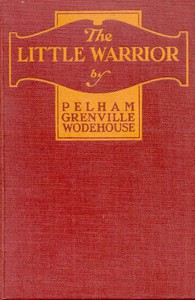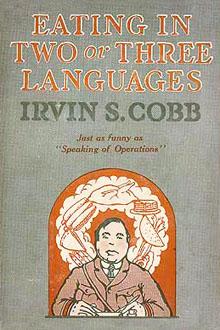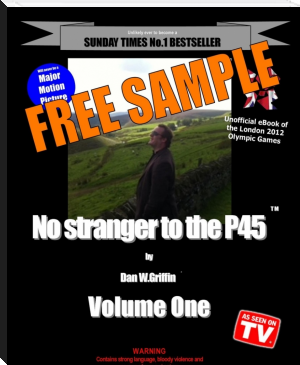The Little Warrior by P. G. Wodehouse (top 50 books to read txt) 📗

- Author: P. G. Wodehouse
Book online «The Little Warrior by P. G. Wodehouse (top 50 books to read txt) 📗». Author P. G. Wodehouse
The silence had the effect of making her think more clearly than in the first rush of pity she had been able to do. She was able now to review the matter as it affected herself. It had not been easy to grasp, the blunt fact that she was penniless, that all this comfort which surrounded her was no longer her own. For an instant a kind of panic seized her. There was a bleakness about the situation which made one gasp. It was like icy water dashed in the face. Realization had almost the physical pain of life returning to a numbed limb. Her hands shook as she arranged the flowers, and she had to bite her lip to keep herself from crying out.
She fought panic eye to eye, and beat it down. Uncle Chris, swiftly recovering by the fireplace, never knew that the fight had taken place. He was feeling quite jovial again now that the unpleasant business of breaking the news was over, and was looking on the world with the eye of a debonair gentleman-adventurer. As far as he was concerned, he told himself, this was the best thing that could have happened. He had been growing old and sluggish in prosperity. He needed a fillip. The wits by which he had once lived so merrily had been getting blunt in their easy retirement. He welcomed the opportunity of matching them once more against the world. He was remorseful as regarded Jill, but the optimist in him, never crushed for long, told him that Jill would be all right. She would step from the sinking ship to the safe refuge of Derek Underhill’s wealth and position, while he went out to seek a new life. Uncle Chris’ blue eyes gleamed with a new fire as he pictured himself in this new life. He felt like a hunter setting out on a hunting expedition. There were always adventures and the spoils of war for the man with brains to find them and gather them in. But it was a mercy that Jill had Derek. …
Jill was thinking of Derek, too. Panic had fled, and a curious exhilaration had seized upon her. If Derek wanted her now, it would be because his love was the strongest thing in the world. She would come to him like the beggar-maid to Cophetua.
Uncle Chris broke the silence with a cough. At the sound of it, Jill smiled again. She knew it for what it was, a sign that he was himself again.
“Tell me, Uncle Chris,” she said, “just how bad is it? When you said everything was gone, did you really mean everything, or were you being melodramatic? Exactly how do we stand?”
“It’s dashed hard to say, my dear. I expect we shall find there are a few hundreds left. Enough to see you through till you get married. After that it won’t matter.” Uncle Chris flicked a particle of dust off his coat-sleeve. Jill could not help feeling that the action was symbolical of his attitude towards life. He flicked away life’s problems with just the same airy carelessness. “You mustn’t worry about me, my dear. I shall be all right. I have made my way in the world before, and I can do it again. I shall go to America and try my luck there. Amazing how many opportunities there are in America. Really, as far as I am concerned, this is the best thing that could have happened. I have been getting abominably lazy. If I had gone on living my present life for another year or two, why, dash it! I honestly believe I should have succumbed to some sort of senile decay. Positively I should have got fatty degeneration of the brain! This will be the making of me.”
Jill sat down on the lounge and laughed till there were tears in her eyes. Uncle Chris might be responsible for this disaster, but he was certainly making it endurable. However greatly he might be deserving of censure, from the standpoint of the sterner morality, he made amends. If he brought the whole world crashing in chaos about one’s ears, at least he helped one to smile among the ruins.
“Did you ever read ‘Candide’, Uncle Chris?”
“‘Candide’?” Uncle Chris shook his head. He was not a great reader, except of the sporting press.
“It’s a book by Voltaire. There’s a character in it called Doctor Pangloss, who thought that everything was for the best in this best of all possible worlds.”
Uncle Chris felt a touch of embarrassment. It occurred to him that he had been betrayed by his mercurial temperament into an attitude which, considering the circumstances, was perhaps a trifle too jubilant. He gave his mustache a pull, and reverted to the minor key.
“Oh, you mustn’t think that I don’t appreciate the terrible, the criminal thing I have done! I blame myself,” said Uncle Chris cordially, flicking another speck of dust off his sleeve. “I blame myself bitterly. Your mother ought never to have made me your trustee, my dear. But she always believed in me, in spite of everything, and this is how I have repaid her.” He blew his nose to cover a not unmanly emotion. “I wasn’t fitted for the position. Never become a trustee, Jill. It’s the devil, is trust money. However much you argue with yourself, you can’t—dash it, you simply can’t believe that it’s not your own, to do as you like with. There it sits, smiling at you, crying ‘Spend me! Spend me!’ and you find yourself dipping—dipping—till one day there’s nothing left to dip for—only a far-off rustling—the ghosts of dead bank-notes. That’s how it was with me. The process was almost automatic. I hardly knew it was going on. Here a little—there a little. It was like snow melting on a mountain-top. And one morning—all gone!” Uncle Chris drove the point home with a gesture. “I did what I could. When I found that there were only a few hundreds left, for your sake I took a chance. All heart and no head! There you have Christopher Selby in a nutshell! A man at the club—a fool named—I’ve forgotten his damn name—recommended Amalgamated Dyestuffs as a speculation. Monroe, that was his name, Jimmy Monroe. He talked about the future of British Dyes now that Germany was out of the race, and … well, the long and short of it was that I took his advice and bought on margin. Bought like the devil. And this morning Amalgamated Dyestuffs went all to blazes. There you have the whole story!”
“And now,” said Jill, “comes the sequel!”
“The sequel?” said Uncle Chris breezily. “Happiness, my dear, happiness! Wedding bells and—and all that sort of thing!” He straddled the hearth-rug manfully, and swelled his chest out. He would permit no pessimism on this occasion of rejoicing. “You don’t suppose that the fact of your having lost your money—that is to say—er—of my having lost your money—will affect a splendid young fellow like Derek Underhill? I know him better than to think that! I’ve always liked him. He’s a man you can trust! Besides,” he added reflectively, “there’s no need to tell him! Till after the wedding, I mean. It won’t be hard to keep up appearances here for a month or so.”
“Of course I must tell him!”
“You think it wise?”
“I don’t know about it being wise. It’s the only thing to do. I must see him tonight. Oh, I forgot. He was going away this afternoon for a day or two.”
“Capital! It will give you time to think it over.”
“I don’t want to think it over. There’s nothing to think about.”
“Of course, yes, of course. Quite so.”
“I shall write him a letter.”
“Write, eh?”
“It’s easier to put what one wants to say in a letter.”
“Letters,” began Uncle Chris, and stopped as the door opened. Jane the parlormaid entered, carrying a salver. “For me?” asked Uncle Chris.
“For Miss Jill, sir.”
Jill took the note off the salver.
“It’s from Derek.”
“There’s a messenger-boy waiting, miss,” said Jane. “He wasn’t told if there was an answer.”
“If the note is from Derek,” said Uncle Chris, “it’s not likely to want an answer. You said he left town today.”
Jill opened the envelope.
“Is there an answer, miss?” asked Jane, after what she considered a suitable interval. She spoke tenderly. She was a great admirer of Derek, and considered it a pretty action on his part to send notes like this when he was compelled to leave London.
“Any answer, Jill?”
Jill seemed to rouse herself. She had turned oddly pale.
“No, no answer, Jane.”
“Thank you, miss,” said Jane, and went off to tell cook that in her opinion Jill was lacking in heart. “It might have been a bill instead of a love-letter,” said Jane to the cook with indignation, “the way she read it. I like people to have a little feeling!”
Jill sat turning the letter over and over in her fingers. Her face was very white. There seemed to be a big, heavy, leaden something inside her. A cold hand clutched her throat. Uncle Chris, who at first had noticed nothing untoward, now began to find the silence sinister.
“No bad news, I hope, dear?”
Jill turned the letter between her fingers.
“Jill, is it bad news?”
“Derek has broken off the engagement,” said Jill in a dull voice. She let the note fall to the floor, and sat with her chin in her hands.
“What!” Uncle Chris leaped from the hearth-rug, as though the fire had suddenly scorched him. “What did you say?”
“He’s broken it off.”
“The hound!” cried Uncle Chris. “The blackguard! The—the—I never liked that man! I never trusted him!” He fumed for a moment. “But—but—it isn’t possible. How can he have heard about what’s happened? He couldn’t know. It’s—it’s—it isn’t possible!”
“He doesn’t know. It has nothing to do with that.”
“But …” Uncle Chris stooped to where the note lay. “May I … ?”
“Yes, you can read it if you like.”
Uncle Chris produced a pair of reading-glasses, and glared through them at the sheet of paper as though it were some loathsome insect.
“The hound! The cad! If I were a younger man,” shouted Uncle Chris, smiting the letter violently, “if I were … Jill! My dear little Jill!”
He plunged down on his knees beside her, as she buried her face in her hands and began to sob.
“My little girl! Damn that man! My dear little girl! The cad! The devil! My own darling little girl! I’ll thrash him within an inch of his life!”
The clock on the mantelpiece ticked away the minutes. Jill got up. Her face was wet and quivering, but her mouth had set in a brave line.
“Jill, dear!”
She let his hand close over hers.
“Everything’s happening all at once this afternoon, Uncle Chris, isn’t it!” She smiled a twisted smile. “You look so funny! Your hair’s all rumpled, and your glasses are over on one side!”
Uncle Chris breathed heavily through his nose.
“When I meet that man …” he began portentously.
“Oh, what’s the good of bothering! It’s not worth it! Nothing’s worth it!” Jill stopped, and faced him, her hands clenched. “Let’s get away! Let’s get right away! I want to get right away, Uncle Chris! Take me away! Anywhere! Take me to America with you! I must get away!”
Uncle Chris raised his right hand, and shook it. His reading-glasses, hanging from his left ear, bobbed drunkenly.
“We’ll sail by the next boat! The very next boat, dammit! I’ll take care of you, dear. I’ve been a blackguard to you, my little girl. I’ve robbed you, and swindled you. But I’ll make up for it, by George! I’ll make up for it! I’ll give you a new home, as good as this, if I die for it. There’s nothing I won’t do! Nothing! By Jove!” shouted Uncle Chris, raising his voice in a red-hot frenzy of emotion, “I’ll work! Yes, by Gad, if it comes right down to it, I’ll work!”
He brought his fist down with a crash on the table where Derek’s flowers stood in their bowl. The bowl leaped in the air and tumbled over, scattering the flowers on the floor.
In the lives of each one of us, as we look back and review them in retrospect, there are certain desert wastes from which memory winces like some tired traveller faced with a dreary stretch of road. Even from the security of later happiness we cannot contemplate them without a shudder. Time robs our sorrows of their sharp vividness, but the horror of those blank, gray days never wholly passes. It remains for ever at the back of our consciousness to remind us that, though we may have struggled through it to the heights, there is an abyss. We may dwell, like the Pilgrim, on the Delectable Mountains, but we never





Comments (0)